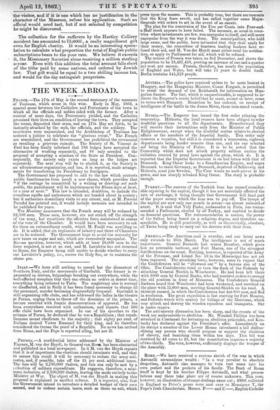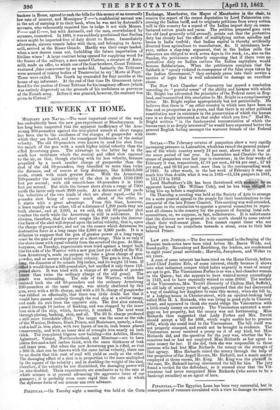THE WEEK ABROAD
TELNez.—The 17th of May is the second centenary of the massacre of Toulouse, which arose in this wise. Early in May, 1662, a quarrel arose between the Catholics and Protestants of the town in which all the officials and nobles sided with the former. After a contest of some days, the Protestants yielded, and the Catholics promised their lives on condition of leaving, the town. They accepted the terms, deposited their arms, and on 17th May set forth, to be instantly attacked by the mob, the officials, and the soldiery. The murderers were unpunished, and the Archbishop of Toulouse has ordered a jubilee to celebrate the "glorious event." The French are scandalized, and the Government has prohibited the ceremonial as recalling a grievous episode. The Society of St. Vincent de Paul has been finally informed that 766 lodges have accepted the alternative of working separately, and 88 only acceded to the proposal of accepting a nominee of the State as President. Con- sequently, the society only exists so to as the lodges act separately. The next step will be to abolish it, as the Society is an ultramontane organization, and has, it is reported, made arrange- ments for transferring its Presidency to foreigners. The Government has proposed to add to the law Which protects public functionaries from insult a. new clause, which provides that "if the outrage be committed by a writing or drawing not made _public, the punishment will be imprisonment for fifteen days at least, or a year at most." This law is intended, donbtless, to include the countless squibs and caricatures which are handed about in society; but it authorizes domiciliary visits to any extent, and, as M. Prevost Paradol has pointed out, it would include memoirs not intended to be published for years.
The Afoniteur announces that the French army will he reduced by 32,000 men. These men, however, are not struck off the strength of the army, but constitute the effective force maintained in excess of the vote of the Chamber. It would have been necessary to ask for them an extraordinary credit, which M. Fould was unwilling to do. It is added, that six reoiments of infantry and three of Chasseurs are to be reduced. The d'overnment hope to avoid the necessity for new taxes on sugar and salt, which are excessively unpopular. The Roman question, however, which adds at least 16,000 men to the force required, is not at an end, and M. Lavalette has not returned to Rome, the Emperor being still unable to decide whether to carry out Lavalette's policy, i.e., coerce the Holy See, or to maintain the status quo.
ITALY.—We have still nothing to record but the discontent of Southern Italy, and the movements of Garibaldi. The former is re- presented as serious, brigandage breaking out everywhere, while the well-affected complain that they can obtain no orders in decent time, everything being referred to Turin. The magistracy also is corrupt or disaffected, and in Sicily it has been found necessary to change all the personnel, murder becoming disgracefully frequent. Garibaldi is still organizing rifle clubs, and has addressed the ladies in the theatre at Parma, urging them to throw off the dominion of the priests, a lecture received with frantic demonstrations of approval. He has been everywhere received with enthusiasm, and reports that 300 rifle clubs have been organized. In one of his speeches to the artisans of Parma, he declared that he was a Republican ; that repub- licanism meant obedience to the majority ; that eighty per cent. of Italians desired Victor Emanuel for their king, and he therefore considered the throne the proof of a Republic. No news has arrived from Rome, and the Pope is reported ailing, but not ill.
PRUSSIC—A confidential letter addressed by the Minister of Finance, M. von der Heydt, to General von Roca, has been abstracted and published in a local newspaper. In it M. von der Heydt repeats that it is of importance the elections should terminate well, and that to secure this result it will be necessary to reduce the army esti- mates, and, if possible, take off the 25 per cent. additional taxes. The loss will be 3,700,000 thalers, and this can only be met by a 'eduction of military expenditure. He suggests, therefore, a mini- mum reduction of 2,500,000 thalers, leaving the mode entirely to the Minister at War. The object of M. von der Heydt in making this proposal is explained in another column. It is reported, also, that the Government intend to introduce a detailed budget of their own accord, and to reduce certain taxes, such as those on salt, which press upon the masses. This is probably true, but there are rumours that the King fears revolt, and has called together some Major- Generals with orders to act in the event of an emeate.
The plan for the conversion of the Five per Cents. into Four-and- a-Half stock appears to have failed. The measure, as usual in coun- tries where investments are few, was unpopular in itself, and still more unpopular from the way it was done. The municipalities, who hold large sums, and the public, have intimated that they shall apply for their money, the committee of fourteen leading bankers have re- fused their aid, and M. Von der Heydt must either recal his notifica- tion, or apply to Parliament for aid, which will be refused. The census of Prussia was taken on 3rd December, and shows the population to be 18,497,458, proving an increase of one and a quarter per cent. per annum. Prussia, therefore, has nearly the population of England and Wales, but will take 75 years to double itself. Berlin contains 545,319 people.
AUSTRIA.—The police have received orders to be more lenient in Hungary, and the police Minister, Count Forgach, is permitted to resist the demand of the Reichsrath for information on Hun- garian finance. The fact, which is unquestionable, is supposed to in- dicate the Emperor's secret belief that he must, sooner or later, come to terms with Hungary. Meantime he has ordered, on receipt of intelligence of the battle in the James River, three iron-eased vessels.
Russte.—The Emperor has issued the first order relaxing the censorship. Hitherto, the local censors have been obliged to refer doubtful questions to all the departments. Henceforward they will receive their instructions only from the Minister of Public Enlightenment, except when the doubtful matter relates to clerical affairs or the members of the Imperial family. This order only removes a vexation, but still it is considered a concession, eighteen departments being harder censors than one, and the one selected not being the Ministry of Police. It is to be noted that the Censorship which does not attack property seldom excites the irritation created by penal laws against the press, which do. It is reported that the Imperial Government is on bad terms with that of Denmark. King Oscar looks to a Scandinavian Empire, and urges Denmark to resist Germany, as Denmark, deprived of Schleswig and Holstein, must join Sweden. The Czar wants no such power at his gates, and has sharply rebuked King Oscar. The story is probable enough.
TURKEY.—The success of the Turkish loan has caused consider. able rejoicing in the capital, though it has not materially affected the rate of exchange, it being thought that Government will fund part of the paper money which the loan was to pay off. The troops of the capital are now only one month in arrear—an almost unheard-of event. It is said that Vely Pasha, ambassador in Paris, has recom- mended a Parliament, elected by all Turkey, and enabled to decide on financial questions. The recommendation is useless, the power of the Sultan being based on a religious dogma, and therefore un- assailable. He is still practically, as well as theoretically, absolute, all Turks being ready to carry out his decrees with their lives.
AXERICS.—The American mail is overdue, and our latest news only extends to 26th March. The intelligence is not of much importance. General Burnside had seized Beaufort, which gives him an accessible harbour, and Fort Macon, one of the strongest fortifications on the coast. Nothing, however, is reported of the Army of the Potomac, and Island No. 10 in the Mississippi has not yet been captured. The attacking force, however, seem to expect that the Confederates will be " &owned out" by a furious rise of the Ohio. The Confederates tried to turn the flank of the Federals by attacking General Shields in Winchester. He had been left there with 8000 men by General Banks, who had received orders to occupy the old position in front of Manassas. The Confederate General Jackson heard that Winchester had been weakened, and marched on the place with 15,000 men, meeting General Shields on his road. A skirmish ensiled, in which the Confederates lost but 600 men, and fled in confusion. The great expedition is fast starting for Fort Monroe, and Federals watch with anxiety for tidings of the Merrimac, which may attack and destroy the wooden squadron and transports. She is under repairs.
The anti-slavery discussion has been sharp, and the events of the week are unfavourable to abolition. Mr. Wendell Phillips has been attacked in Cincinnati for lecturing on abolition principles, and Ken- tucky has declared against the President's offer. Immediately on its receipt a member of the Lower House introduced a bill disfran- chising any person who should propose or support the abolition of slavery, and banishing them within ten days. This bill was received by 48 votes to 28, but the constitution requires a majority of two-thirds. The vote, however, sufficiently displays the temper of
the Assembly. .
ROME. —We have received a curious sketch of the way in which Antonelli accumulates wealth : " In a way peculiar to absolute despotism, Antonelli also manages to turn vast sums into his own pocket and the pockets of his family. The Bank of Rome itself is kept by his brother Filippo Antonelli, and what presen- tations may there take place are of course unknown. This year, however, an illustration of strange dealings came out ; 20001. collected in England as Peter's pence were sent over to Monsignor T., the Pope's Irish Chamberlain. Messrs. P— and C—,EnglishCatholic
bankers in Rome, agreed to cash the bills for this money at an unusually low rate of interest, and Monsignor T—'s confidential servant was in the act of carrying it to their bank, when he was met by Antonelli's servants, who vehemently required him to lodge it not with Messrs. P— and C—, but with Antonelli, and the man, overwhelmed by menaces, consented. In 1860, it was suddenly proclaimed that Sicilian wines might be imported free of duty direct to Rome. Immediately afterwards, sixteen vessels laden with them, and belonging to Auto- nelli, arrived at the Risser Grande. Hardly was their cargo landed, when a new decree came out, forbidding the future importation of Sicilian wines ! A large contract being opened for supplying wood for the fences of the railways, a man named Cortere, a creature of Auto- nelli, made an offer, to which one of the four brothers, Count Trittone, ventured faire concurrence by an under-bid. Instantly the Trittones were accused of raising bodies of Trasteverini to cry !Mode al Pape.' Three were exiled. The fourth lay concealed for feur months at the house of my informant. At the end of that time De Grammont inter- fered for the pardon of Count Trittone for his imaginary offence (which was entirely disproved) on the grounds of his usefulness as purveyor of the French army. Before it was granted, however, the contract was given to Cortesi !"































 Previous page
Previous page